 |
|
Home
creative
things
|
 |
| |
 |
research and facts
|
 |
| |
 |
images and misc
|
 |
| |
 |
archives of long ago
|
 |
| |
|
|
Season One - Season Two - Season Three - Season Four - Season Five - Season Six - Season Seven - Season Eight - Season Nine
Season Three - Galaxy 4
10th October 2007
What a tedious season opener! Episode one has basically two main events - The Doctor and his companions see some robots, and the Doctor and his companions meet some women. At the end they learn the planet is doomed. Episode two has a bit of wandering around, some tedious mucking about in the Drahvin's ship and lots of threats are bandied about, and Vicki finally glimpses a hideous Rill. Two episodes which could be edited down to about ten minutes without losing much.
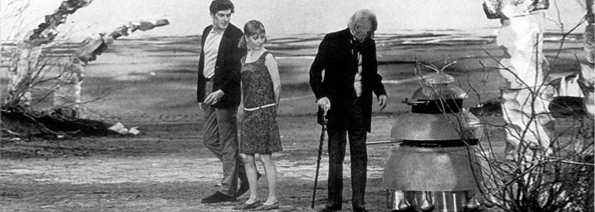
Whilst the padding is not a crime in itself, nothing about this story seems exciting or engaging. The dialogue is flat and the setting consists of only three places - the planet's surface, and two different spaceships. The only real character other than the regulars is the lead Dahvin, Maaga but she is a one dimensional matriarch, so this gives you nothing to empathise with. People argue that The Web Planet doesn't work because there are no humanoid characters to latch onto, but Galaxy 4 is far less enjoyable for the same reason. I'd much rather learn about the Menoptra than the Drahvins.
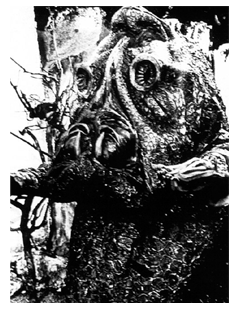 The moral of this story is not to judge people at face value, but the whole premise is undermined by the fact that the Drahvins act like bitches from the outset, thus ruining any possible twist at the end! It's so obvious that the Rills are going to be pleasant chaps. The moral of this story is not to judge people at face value, but the whole premise is undermined by the fact that the Drahvins act like bitches from the outset, thus ruining any possible twist at the end! It's so obvious that the Rills are going to be pleasant chaps.
This is Steven's second full story and he's totally side-lined. He chucks in a painfully sexist remark upon seeing the beautiful Drahvins, but that aside does nothing remarkable. He fills the same role as Ian but hasn't had his character properly defined. He is asleep for portions of episodes two and three, whilst the stilted Drahvins further fill out the uneventful episodes with long discussions about how Earth people are a bit weird. The final episode also drags as they wait for the planet to blow up, but the nice people escape in the end.
Just when you think this story has nothing interesting or unusual to offer, at the very last moment we get one of the most surreal moments in the series. Vicki spies a planet on the scanner screen and wonders what's going on that planet. The Doctor wonders too. The camera zooms in and bizarrely, we get to find out what is happening, without the Doctor or his companions ever landing there! Because this is a lead-in to...
Mission to the Unknown
 An extraordinary interlude. I don't know what pre-publicity for this episode would have been like but to come out of one story and into a stand-alone episode is really weird. If I hadn't known in advance, I would have been glancing at my watch after ten minutes wondering why the Doctor hadn't turned up yet. But the Daleks are in it again, hooray! Although it really doesn't seem that long since they were last around. An extraordinary interlude. I don't know what pre-publicity for this episode would have been like but to come out of one story and into a stand-alone episode is really weird. If I hadn't known in advance, I would have been glancing at my watch after ten minutes wondering why the Doctor hadn't turned up yet. But the Daleks are in it again, hooray! Although it really doesn't seem that long since they were last around.
The Myth Makers
The Myth Makers is quite delightful and increases in interest and excitement as the story progresses. As with The Reign of Terror, the story is marching towards a date with destiny and known historical events. Having our time-travellers on both sides of the conflict adds an extra dimension as its not safe for either side to win. The whole story reaches a crescendo as the horse is wheeled into the city and the incidental music of Humphrey Sears greatly adds to the drama.
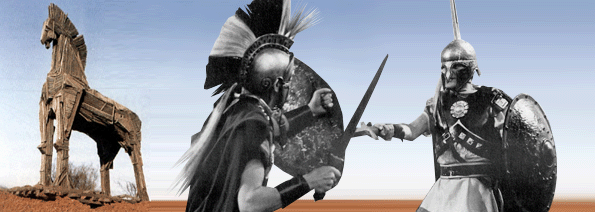
The departure of Vicki sits well with the chaotic ending as Steven is badly wounded, a Trojan called Katarina is swept into the TARDIS and the Doctor just manages to escape. I liked Vicki and her departure is more than a little tragic, besotted with a man who thinks her a traitor. But she finds her man and there’s a chance that they live happily ever after.
So another young female companion is gone, married off with the first bloke she takes a shine to, just like the last girl companion went. But her replacement is already waiting in the wings, and looks to be an interesting twist on the usual type. Kararina is primitive, obedient and thinks the Doctor is a god. It could get a little tiresome but I’m sure there’s room to develop this girl. Just a shame the Doctor fluffs his rather portentous line as he looks straight into the camera and says, “I am not a Doc. Er, dog. No, duck! No... a god! That’s it, I’m not a god!”
So with Steven lying half dead, Vicki gone and some random Trojan slave girl around, the TARDIS touches down.
The Daleks Masterplan
The Nightmare Begins.... slowly. After the thrills of the sacking of Troy, the peaceful jungle has a lurking menace but this is a very slow start. Suddenly there are references to the one-off randomness from four weeks ago and it’s clear the Daleks are going to turn up, which they do in striking style. Suddenly one appears in the midst of the undergrowth, viewed from below, and exterminating its victim in total silence.
The first two episodes are all about establishing the premise. By the end of episode two, we have met a new friend, Bret Vyon, and the Doctor manages to walk into the Daleks’ headquarters and sit in a conference, listen to their plan, steal the one component they can’t continue without, and escape. Our heories nick a spacehip and the adventure is under way. Katarina is kind and meek but is just kind of swept along with the adventure, not really knowing what’s going on at any point. In this respect she’s a little useless because she just stands about and does what’s she’s told. Bret seems a nice chap though.
Episode four is not long in when we get one of Doctor Who’s most shocking moments so far. Katarina’s tortured screams are heard in the airlock and they are so loud that they barely allow us to hear the other characters’ lines of dialogue. It is a horrible scene culminating in her sacrificing herself. So another replacement young female is gone and we hardly knew her. For the first time since the show started, there is no lead female co-star. But wait.... Before the episode is out we meet Sara Kingdom. She’s a tough lady who is going to hunt down our heroes so she can't be the next companion. But before you can say Tarranium Core, she’s won over and becomes a goodie after all.
Episode five launches the Doctor, Steven and Sara off on the next leg of their journey and a tiny feeling starts to creep in that this story isn’t going anywhere. By this point in the previous Dalek story, The Chase, our heroes had already arrived on what was to be the final battleground with the Daleks but it doesn’t feel like this Masterplan is winding up just yet... However the script and directing are tight so I’m not losing interest just yet. I was thinking how good the Dalek voices are in I realised that since this was last made, the Cushing film has been made with very similar voices.
Myra, parallel with Mechanus in terms of position within the plot, is a brilliant studio set by comparison to the awful one in the last Dalek story. Makes you wonder what budgetary changes have come about, or if it's a reallocation of resources, or simply a better designer.
The Daleks Master Plan episode six, Coronas of the Sun, is extensively about the Daleks’ failure. The Doctor steals the Daleks’ own ship and escapes. This might almost feel like it was heading towards a conclusion at the end of these half dozen episodes. However then things take a change of direction.
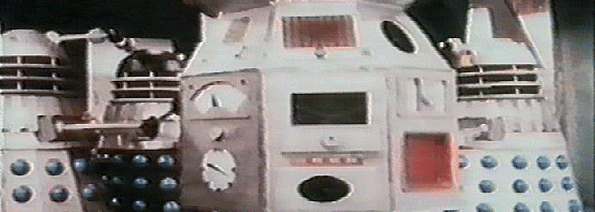
The Feast of Steven makes me want to pull my brain out through my ears. It's so awful I'd be prepared to debate the canonicity of this episode just so we could all sleep more peacefully in our beds. Grounds to wipe it from the canon: Firstly: It was clearly designed to stand alone so that it could be edited out for re-sale and therefore it is less valid as a true episode. Secondly, it has on-screen parody slide captions for the awful silent movie sequences, totally unknown to the format of the show. And thirdly, it ends with the Doctor addressing the camera directly and speaking to the viewers at home, thus totally breaking out of character and destroying the fictional illusion. I would happily bracket this painful episode with any comedy parody or Jim'll Fix It sketch and it should be wiped from my memory.
Interestingly, The Feast of Steven Christmas episode is the first time the Doctor has visited contemporary Earth since the series began (discounting when they were the wrong size!). Not only that but he does it again in the very next episode when a week later it’s new years eve! And the irony is, this is only four stories after sending Ian and Barbara off to the wrong year in the Dalek time machine because he kept failing to land on modern-day Earth!
The next episode picks up the plot again and to be honest the whole thing is tiresome by this stage. Episode eight finds the Daleks discovering they are without their Tarranium, their device to conquer the universe can't work, and they need to recover it from the Doctor who is fleeing through time and space. Isn't that exactly where the story started? You could have edited out everything that happened between episodes two and seven, and not noticed anything except one female companion has changed into another. We do however get the immortal line of dialogue from Mavic Chen: "It came from Uranus!"
Sadly the stupid comedy still drags on with the TARDIS landing at a cricket match as the Daleks longwindedly prepare to make chase, but into all this random mix the Time Meddler himself is thrown in!
The Monk is a nice character to see again although it's not clear exactly why he's still in his religious garb and it's odd that he doesn't get a name. Still, but I supposed the Doctor never has. Butterworth is entertaining but the sudden lurch towards comedy since the Christmas episode seven isn't in keeping with the magnificently tough and gritty early part of the story.
Episode eleven has a lot of wandering about, chatting, and not much else as they arrive back on Kembel but no Daleks are to be seen. The final episode sees this long-winded epic culminate in dramatic style with a tense stand-off with the Daleks. One hell of a story this, spanning three months and serving up a downbeat ending with the death of a yet another pseudo-companion. The key word for this whole finale is "intense" and following the destruction of time, the Doctor and Steven, being the only survivors, reflect on all they have lost.
The Massacre
The Massacre doesn’t dwell for a second on the horrors of The Dalek adventure they left behind and the one-companion arrangement seems to work a charm as for the first time the dialogue setting the scene is crisp, without any group argument and it all works rather nicely. The first back-reference for quite some time comes from when Steven is asked where he's been travelling and he says Egypt.
The religious setup for this adventure is somewhat convoluted to the uninitiated and the story has to reiterate the situation at every opportunity which certainly helps me as I can never remember the different religions. I though I’d just got my head around Protestants and Catholics and instead they use the term Huguenot!
I sense unease as Steven makes new friends. The episode ends with an interesting twist as the Doctor appears to be the feared Abbot of Amboise. It will be extremely interesting to see how this develops in the next episode.
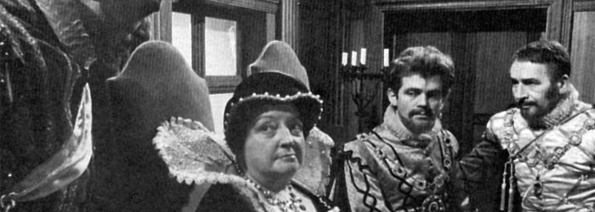
Episode two has no recap which totally threw me. No chance to enjoy again the confusing moment of the Doctor being this Abbot bloke. In fact as the episode unfolds, there’s no Hartnell in any guise! Having been promised two roles to see him in, we have none!
Steven is an odd person to have running the show and the confusing religious plot requires the writer to keep on reminding us of the two sides. Episode two ends weirdly with a non-event of a cliff hangar. Only the promise of this Abbot mystery gives it merit. Ann doesn’t quite fulfil the companion role and doesn’t do much to suggest she has the potential to be a full-time time-traveller. Aside from one gobby old woman peasant the serial has been severely lacking in good female characters, emphasised by the lack of a girl companion for the first time since the show started.
And so The Massacre ends in a crazy mixture of things. Steven is up to his neck in plot, but ultimately has no impact on what happens. The one piece of information he gleans, he fails to use to save the General from being shot. But this becomes irrelevant because The General doesn’t die in the attempt anyway!
It suddenly seems totally clear that The Abbot actually is the Doctor, which makes things far more interesting! But then the Abbot is killed and the Doctor turns up! The Doctor realises what’s about to happen (some Massacre that no-one is taught about in school) and, having barely been involved, they all leg it. The not-very-well known historical events play out and I’m left rather bemused. The Doctor wasn’t the Abbot but everything suggested that he was. The historical events we saw were neither clear, interesting, or teaching any lessons except the one we know: religion results in conflict and death.
However once the time-travellers take off it becomes really engaging. Because Ann was left to die in the massacre, Steven takes the Doctor to task on his refusal to change history and they have a frosty exchange resulting in Steven suddenly bidding farewell.
It’s a weird decision for him to leave because Steven is from the far future but could be stepping off the TARDIS anywhere! It's a decent departure for Steven who although not very three-dimensional at least had strong opinions about things. He leaves the TARDIS and in one of the series’ best moments The Doctor reflects on all the people who left him, and now Steven too. Even more exciting, the Doctor for a second contemplates going back home – yet again suggesting he perhaps is in control of the TARDIS after all!
Meanwhile, outside, a girl approaches the most awful TARDIS prop ever seen! What's going on with the sides of this prop?! The girl is gobby with a strange scouse cockney accent. Steven bursts back in. The following scene is so contrived it’s almost post-modern as she announces her name is Dodo Chaplet, and that her granddad was French, thus proving that Ann didn’t die! Presumably this means Ann was already married although she was very young! Did they call her Miss Chaplet or Mrs, I can’t remember?
Anyway Dodo she says she conveniently hasn’t got any parents to miss her, she doesn’t bat an eyelid when time travel is mentioned, the Doctor points out she looks a bit like his granddaughter Susan, and off they go!
A surreal and interesting ending to an otherwise uninspiring story.
The Ark
It's another great forest set, into which our new (sneezing) companion steps. She and Steven exchange jibes as if they're old friends. We discover that she's extremely knowledgable about nature and has been to Whipsnade Zoo, but other than that the Doctor seems to express no interest whatsoever in getting to know this new girl.
There's not even any suggestion that Dodo doubts their claim that they time travel because her conviction that they're on Earth seems based on the fact that she's seen some Earth animals, rather than the fact that time-travel is impossible! She's very open minded, as well as forthright and seems to have a sense of humour.
It's a very unusual start in many ways. The crew has met an elephant, Dodo has inexplicably changed her clothes, begged not to be taken home, they found there's no sky, and there are drawings on the wall of Zebras with two heads. It's all quite a fascinating setup with the viewer fed loads of intersting bits of information about this futuristic world.
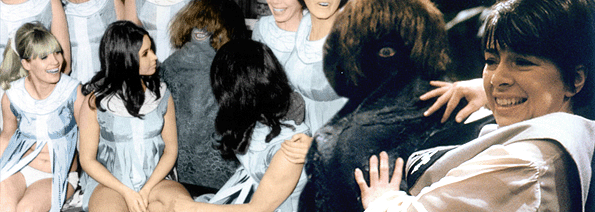
Nero, The Trojan Horse, and the Daleks are all mentioned in a breath as it's revealed we're ten million years in the future the people on the ship are the last vestages of humanity in an Ark. Lot's of scantilly clad beauties are on show and all these nice people are going to safeguard the human race with the help of the rather fun-looking mop-head Monoid servants. Episode one packs a hell of a lot in as it culminates with the time-travellers apparently spelling doom for the whole future race.
Episode two is less remarkable, with our heroes on trial and Steven having to hold his own under tough circumstances. New companion Dodo is rather funny and despite her slightly annoying traits, I'm rather enjoying her vibrancy.
The Doctor takes exception to her use of the phrase "okay" which I find quite amazing. I know it's a relatively modern phrase (only about 150 years old) but I honestly didn't think it would have got a second thought in the sixties.
Then we get the greatest cliffhangar the programme has ever produced. We've been told previously that the humans are building a statue and it will be ready in hundreds of years. The immediate threat to the human race is resolved, everyone is happy, and the Doctor and company are on their way. A very interesting, well-paced, two-episode adventure all wrapped up and the TARDIS takes off...
But then the TARDIS materialises again... apparently in the same place. They look for the friends they made but the place is desserted. They discover the afforementioned statue and discover it has been finished but instead of the head of a man... it is the head of a Monoid! The implications are enormous! The two-parter is not a two-parter! The story has taken a whole new twist and the mind boggles at the implications. Brilliant and compelling. I love it.
Episode three reveals a recent revolution with humans subjugated. There's a lot of B-movie type stuff in this story but it's all mixed in with some amazing ideas. The time-travelling of the Doctor has caused so many problems to these poor people and twice over nearly extinguished the human race.
We're treated to some fantastic sights. The human capsule floats towards the planet Refusis, there's a rather nifty capsule set with funky folding doors, and then a lovely shot of the Refusian city. Dodo is a great foil, particularly in a slightly comedic moment in which she outwits a moronic Monoid.
The whole story is entertaining, intersting, thought-provoking and with high production values, relative to the time. There are some barmy concepts such as the Refusians being invisible due to a "galaxy accident" and it sounds daft when they say they would welcome the return of visible beings to their world. Despite the sillines, it's another strong concept to take on board. I don't think there's yet been a Doctor Who story which has been so stimulating in terms of real science fiction.
Episode three ends with another intersting cliffhanger: This time their only means of escape is destroyed and the Doctor tells Dodo they may have to live on the new planet on which they have found themselves.
Episode four deals with the problem of finding a bomb which will destroy all humanity, and also our heroes, but the story also touches on discrimination, civil war, collaborators, loyalty and all manner of other interesting things. The final episode is steeped in blood and full of drama, resolving this four-part drama quite spectacularly.
At the end of this extravaganza, two amazing things happen. Dodo changes her clothes yet again and the Doctor becomes invisible! What more could you want from a Doctor Who adventure?
The Celestial Toymaker
The show's diversity seems to know no bounds as we now enter an amazing fantasy realm. We are presented with hundreds of TARDISes, talking toys, and a hypnotic screen which shows memories of their previous adventures including a flashback to Steven in The Daleks Master Plan from a couple of months ago.
Having just had a story in which the consequences of the Doctor's time travel are explored, we are now presented with a situation totally detatched from the laws of physics. The show seems determined to break new ground.
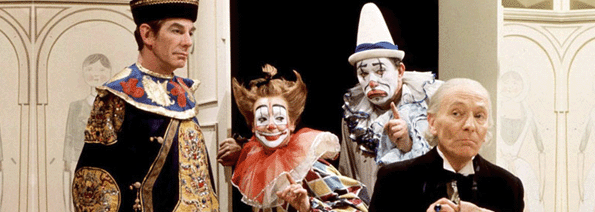
In an unusual plot device, the Doctor already knows the Toymaker from a previous adventure. Was this with Susan before landing in Totter's Lane? Or was this an adventure with Barbara, Ian or Vicki? We know it was only a brief encounter because the Toymaker says the Doctor hardly had time to turn around but still they know each other well.
The end of episode one has an unusual on-screen caption to give us kids at home the chance to solve the riddle presented to the companions. The first episode has been fun but there seems to be limited scope for this adventure to unfold and I'm feeling trepidation that the final three episodes are going to be yet more childish games.
Epsiode two can be condensed into two thre words: The Chair Game.
Worth a mention though is the unexpected event of the TARDIS phone ringing, which Steven answers and the Toymaker speaks to him! Fantastic! Is this part of the normal Police Box disguise of the TARDIS or is this only possibly because of the fantasy realm they are occupying?
Episode three revolves around some kitchen farce and more silly games and each episode still ends with an on-screen riddle.
Epsiode four is still largely padding with another protracted game however it does contain the exceptionally horrific death of Cecil. The sight of his charred and smoking corpse is made all the more horrific by the fact that this was a cheeky, chubby character not entirely unlike the popular Billy Bunter, and not some villainous criminal.
I think if you edited episodes one and four together, you'd have a rather wonderful little fourty-five minute adventure full of invention with less of the padding.
Nevertheless, the finale is quite ingenious and also features a heavily emphasised and portentous prediction by the Doctor that his battle with the Toymaker will continue in a future adventure soon.
The episode ends when the Doctor puts a sweet in his mouth and reacts in horror! Has he been poisoned?!
The Gunfighters
The pain the Doctor suffers is nothing more than toothache and the adventure in the wild west unfolds in a happily entertaining manner. There is lots of intrigue as we get to know the antagonists and we learn that our heroic tee-total time-traveller has been mistaken for the gambling alcoholic trouble-maker Doc Holiday.
The first episode is quite brisk and it's amusing and to see Steven and Dodo selecting the most wonderfully awful country-and-western style costume totally at odds with their contemporary Americans. (This would be a joke repeated 26 years later, when a film by the name of Back to the Future III would have Marty McFly make the same mistake).
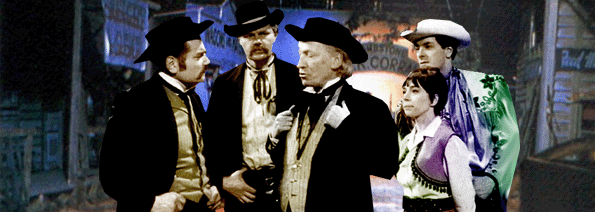
One thing that strikes me is that this is only the second time the TARDIS has landed amongst people with an American accent, and the last time it happened Peter Purves was playing one of them - atop the Empire State Building in The Chase!
The ballad which punctuates the episode is not unpleasant and, with both companions also singing, it conveys the feel of a jolly musical episode. However as this tune is the only one we are treated to, the repetition starts to grate on the ears and even Steven remarks on how often the song is being sung, albeit diagetially.
Hartnell puts in a great performance both in the dentist and in the bar when confronted with the Clantons but the rest of the acting is variable.
I was quite shocked when I heard Doctor Who's first ever swear word. Doc Holiday asks, "Why the hell should I do that?" Is this acceptable for 5.20pm in 1966?
Episode two brushes with the possibility of a resolution to the misunderstanding as the proceedings skirt a little too close to farce. A conclusion at this stage would not be unwelcome to what would have been a short, if inconsequential dally across the Atlantic, but not surprisingly, the story continues into episode three.
Episode three's introduction of Jonny Ringo doesn't do much to keep up my flagging interest and I'm getting mightily tired of the ballad, despite the attempts at variation. Episode four is more of the same inconsequential fluff punctuated by the singing. I do, however, love the line where they talk about the people they're shooting out being "out of range" as if the bullets only go so far, and then drop out of the air.
Steven's accent came and went as much as Dodo seemed to in the narrative. It's rather nice to see her again when she's reunited with the Doctor and they all shuffle off in the TARDIS. A little tiresome, and the music was too much, but not unbearable. The Doctor himself aptly says: "Every cliche-ridden convention in the American West."
The previous few stories had all dove-tailed rather nicely. The Massacre ended with the question of Ann Chaplet surviving, and the question was apparently answered with Dodo arriving, who then had her debut story in the following The Ark. The Ark was a story about invisibility and at the end the Doctor became invisible himself. That invisibility was due to the Toymaker, whose sweets caused the Doctor's dental discomfort for which he sought a remedy in the wild west. It was therefore something of a jolt when at the end of The Gunfighters, there's nothing more subtle than a cross-fade into our travellers' next destination.
As with the realm of The Celestial Toymaker, the Doctor knows all about this new planet on which he has arrived, and he proclaims they have reached "this distant horizon of an age of peace and prosperity."
The next story is unusually captioned "Dr Who and The Savages"!
The Savages
I'm immediately grabbed by the amount of location work. This is the first time a real location has been used to represent an alien planet in a full story, the only other time being Camber Sands doubling for Aridius back in The Chase.
The other thing which strikes me is the incidental music. It gives the whole thing a cinematic quality. It's all thrilling stuff and a far cry from the previous Gunfighters with the story setting up rather nicely in the opening couple of episodes.
Episode three is a bit padded though, but is still filled with tension as Steven and Dodo are hunted in the cave. The light guns are a wonderful fresh take on the usual ray gun and their logical operation is explored both in the Medusa shield trick (aptly done in the Minotaur-like caves), and also when the smoke is used to disperse the beam. Totally sound scientific principles.
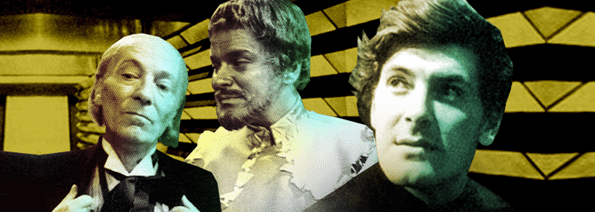
And just when there's a danger that the story might start to flag, the brilliant twist occurs whereby Jano takes on the Doctor's personality. In one way it's lots of fun, but in another it's brilliantly executed and mature drama.
The story considers so many sociological questions, such as slavery, the class system, medicine, and the abuse of technology. I'm really enjoying this "proper" science fiction. Aside from The Ark, it feels like Doctor Who has never really done this before.
The brilliant incidental music continues to elevate the action above the ordinary too.
Steven's departure is quite sudden and, in a way shocking. He's been only the second male companion in the show and his spirit and edge were quite easy to take for granted. His predecessor Ian was quite soft by comparison. Very safe. Steven was more in-your-face and argumentative, and he didn't seem to smile as much as Ian did.
It comes as much of a surprise to him as anyone that he's being asked to leave the TARDIS and the ending is all rather sad, as he glances back on his travelling companions following a decision which seems to be made in the blink of an eye.
The Doctor and Dodo hug and on they go...
The War Machines
The War Machines kicks off surprisingly without a single mention of Steven's departure.
Dodo is back in her own time and takes this in with her usual blaze attitude, however it is the new girl Polly who immediately takes centre stage. She is simply dazzling in every scene, with a brilliantly defined character, but the way Dodo is unceremoniously shunted to the back is rather awful. There are moments where her smile seems painted on as she does her best to make her presence felt in a scene where she has no lines. It puts me in mind of a soon-to-be-former girlfriend watching her boyfriend talking to someone more intersting and more attractive. I feel sorry for Dodo but when she's standing next to Polly there's simply no contest.
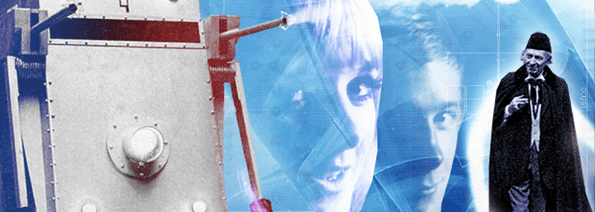
The War Machines is pacey, real and tough.
It features a real-life car in studio and a tramp who says the word "cock". Suddenly, looking back over the high-concept and altogether meatier last half-dozen stories it seems that Doctor Who has grown up. We are even treated to a cockney punch-up in a night club. The series has never seemed so contemporary and lively.
The plot and character development is split beautifully. Normally it's only the historical stories which get the good character development because their stories are less sophisticated but, like The Savages before, The War Machines is based around another strong central science fiction idea.
The Doctor is referred to as "Doctor Who"! Never heard that before! And just in case you thought you were hearing things, you hear it three times!
There is a homely feel to many scenes due to the real-life scenario and there's something strangely comforting about the Doctor figuring out how to save the world in someone's lounge.
Dodo's accent has suddenly turned super-posh but then, astonishingly, she is gone. She never appears again. The treatment of her as both a character and actor is quite unbelievable. Okay so she may not have been super sexy or been expectially three-dimensional, but she was funny and lively. In her place we have Polly, who shows great promise, and Ben, who shouts a lot.
Just to return to the ex-girlfriend metaphor, it adds insult to injury that Dodo's replacement, Polly, delivers the message to the Doctor (and the audience) that Dodo has left us, and the relationship is over. Can we trust the new girl? What if Dodo is just five minutes delayed and she'll be along in a minute? Why didn't the Doctor make more fuss or suspect foul play? Particularly after all the brain-washing that had been going on!
Nevertheless, the Doctor goes inside his time machine alone, and Polly and Ben who have appropriated a key, let themselves into the TARDIS uninvited at the end of the third season..
Season One - Season Two - Season Three - Season Four - Season Five - Season Six - Season Seven - Season Eight - Season Nine |
|
         |